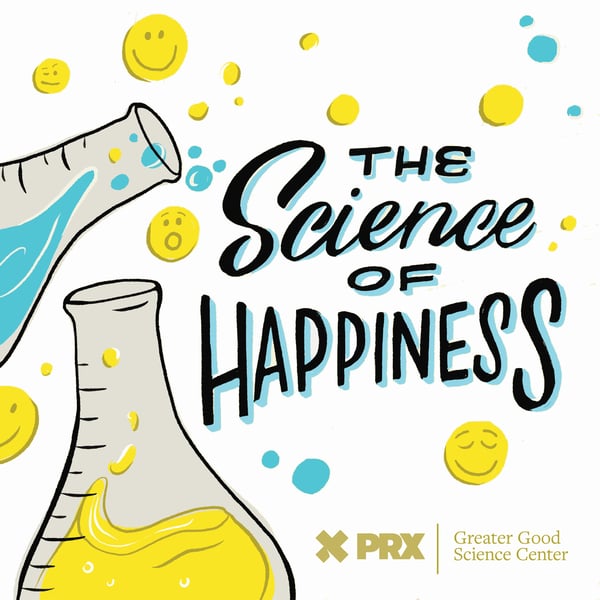How to Say "Sorry" Like You Mean It
The Science of Happiness
PRX and Greater Good Science Center
4.4 • 1.9K Ratings
🗓️ 23 June 2022
⏱️ 18 minutes
🧾️ Download transcript
Summary
Apologies are key to successful relationships. But are you doing them right?
Episode summary:
We all have moments when we say or do something we later regret. Then the time comes to make an apology. But a halfhearted “I’m sorry” rarely gets the job done. On this episode of The Science of Happiness, public defender Sam Dugan joins us for a second time to try science-backed tips for making an effective apology. First, she takes a moment to cultivate mindfulness through a mindful breathing practice. Next, Sam invites us in as she apologizes to her husband Nate. Sam reflects on how she took out her stress on Nate, what led her to lash out, and the importance of making a true, heartfelt apology — as opposed to the mindless ones many of us make on a near-daily basis. Then we hear from Sana Rizvi, a professor at the University of New Brunswick, about the science of how mindfulness can make us more apologetic.
Practice:
Mindful Breathing
Invite your body to relax into a comfortable position.
Tune into the rhythm of your breath, and pay attention as you breathe in through your nose, hold your breath, and exhale through your mouth.
Repeat as many times as you’d like.
Making an Effective Apology
Acknowledge the offense by showing that you recognize who was responsible, who was harmed, and the nature of the offense.
If helpful, provide an explanation, especially to convey that it was not intentional and that it will not happen again.
Express remorse.
Make amends. When considering how to best make amends, be sure to ask the offended person what would mean the most to them.
Learn more about this practice at Greater Good In Action:
https://ggia.berkeley.edu/practice/mindful_breathing
https://ggia.berkeley.edu/practice/making_an_effective_apology
Today’s guests:
Sam Dugan is a public defender in Salt Lake City, Utah. She and her husband Nate have three dogs, and they were on the show last year to try the Three Funny Things practice.
Listen to Sam and Nate on Why Love Needs Laughter: https://tinyurl.com/5s45ps2v
Sana Rizvi is a professor in Organizational Behavior and Human Resource Management at the University of New Brunswick, in Canada.
Learn more about Dr. Rizvi’s work: https://tinyurl.com/4kzs4n4w
Resources for Making an Effective Apology
Hidden Brain - The Power of Apologies: https://tinyurl.com/bdze6yzz
The Verywell Mind Podcast - A Science-Backed Strategy for Making an Effective Apology: https://tinyurl.com/2j6ar3x8
The Atlantic - The Art and Science of Apologizing: https://tinyurl.com/38j2re9d
The New York Times - No, You Don’t Have to Stop Apologizing: https://tinyurl.com/3zwns9n3
More resources from The Greater Good Science Center:
Can Mindfulness Make You Better at Apologizing? https://tinyurl.com/bdes29w5
The Three Parts of an Effective Apology: https://tinyurl.com/3p273tym
A Better Way to Apologize: https://tinyurl.com/34hp2re5
Should You Ask Your Children to Apologize? https://tinyurl.com/4vcrktju
Eight Keys to Forgiveness: https://tinyurl.com/3x7v8rj7
Tell us about your experiences and struggles trying to make a mindful and effective apology by emailing us at [email protected] or using the hashtag #happinesspod.
Help us share The Science of Happiness!
Leave us a 5-star review on Apple Podcasts or copy and share this link with someone who might like the show: pod.link/1340505607
Transcript
Click on a timestamp to play from that location
| 0:00.0 | We got a puppy which is great and awesome and she is a total delight. |
| 0:11.6 | It's also chaos just given work and having two dogs and one of our other dogs is very, |
| 0:19.6 | he's a difficult boy and so it's a lot of like where is Kendo, where is Tonka? |
| 0:27.0 | Make sure the baby gave a shot, make sure the bedroom door is shut. |
| 0:33.3 | My husband, Nate, he's like the last person I should be cranky with but I was not so nice |
| 0:40.6 | to him. |
| 0:41.6 | I was very short and just snapped at him when he didn't deserve to be snapped at and I was |
| 0:49.0 | like this was your idea, you wanted a puppy, I didn't want a puppy. |
| 0:55.4 | What did he do that made you snap at him? |
| 0:57.3 | I think he just existed incorrectly probably. |
| 1:06.2 | We've all been in that place, you're at the end of your rope and you say or do something |
| 1:10.1 | you end up regretting. |
| 1:11.9 | All you need to do is say I'm sorry, right? |
| 1:14.8 | Not quite. |
| 1:15.9 | A real effective apology takes much more than that. |
| 1:19.7 | I'm Dacker Keltner, welcome to the Science of Happiness. |
| 1:23.9 | Today we're exploring the art of making good apologies and how mindfulness practices |
| 1:27.9 | can help. |
| 1:29.6 | Later in the show we'll hear about how cultivating mindfulness can change our thoughts and |
| 1:33.3 | feelings in ways that might actually make us more likely to apologize when we've done |
| 1:37.8 | something wrong, more on that up next. |
| 1:45.8 | Welcome back to the Science of Happiness, I'm Dacker Keltner. |
... |
Please login to see the full transcript.
Disclaimer: The podcast and artwork embedded on this page are from PRX and Greater Good Science Center, and are the property of its owner and not affiliated with or endorsed by Tapesearch.
Generated transcripts are the property of PRX and Greater Good Science Center and are distributed freely under the Fair Use doctrine. Transcripts generated by Tapesearch are not guaranteed to be accurate.
Copyright © Tapesearch 2025.

